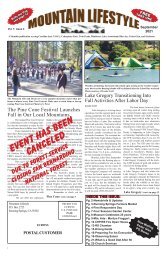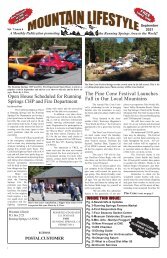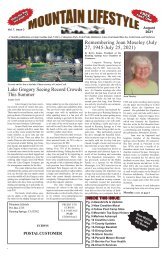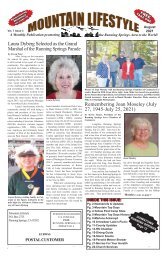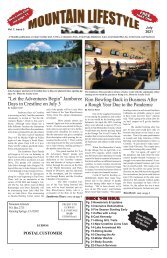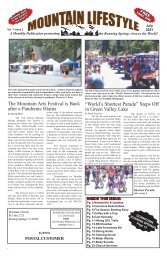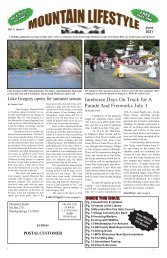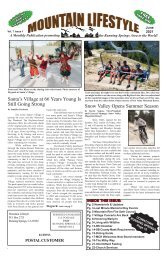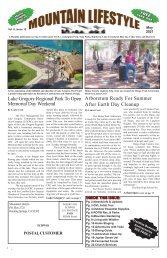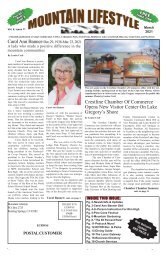Create successful ePaper yourself
Turn your PDF publications into a flip-book with our unique Google optimized e-Paper software.
Hearing Loss & the Brain<br />
Ever notice how some<br />
adults get distracted or tired easily?<br />
It may have to do with changes in<br />
their brains that are related to hearing<br />
loss. Here’s a peek inside the<br />
brain of someone with hearing loss.<br />
How does hearing affect the brain<br />
in the first place?<br />
First, we should look at how<br />
the brain processes sound in adults.<br />
Researchers have studied, and<br />
continue to study, how and where<br />
sounds are processed and perceived<br />
by the brain. They’ve found that<br />
there’s a link between hearing and<br />
cognition - the brain’s process of<br />
perceiving and understanding.<br />
Thanks to magnetic imaging,<br />
scientists can watch the brain<br />
and see how it activates in response<br />
to certain sounds. They’ve discovered<br />
that we don’t hear with just<br />
one part of our brain. The process<br />
of hearing also stimulates other<br />
brain areas.<br />
For ex<strong>amp</strong>le, when a researcher<br />
said a simple word, it activated<br />
the auditory cortex. The auditory<br />
cortex was where that word<br />
was technically heard. But a few<br />
other areas of the brain also lit up<br />
in the cerebral cortex. Those areas<br />
were where that word was understood,<br />
perceived or cognitively<br />
connected.<br />
Scientists believe there’s<br />
a dual-track association between<br />
hearing and cognition. Sound activates<br />
the auditory cortex; the cerebral<br />
cortex and cognitive processes<br />
influence how we hear.<br />
We rely on cognitive elements<br />
of the brain, like working<br />
memory and life experiences, to understand<br />
a conversation in a noisy<br />
place. Surprisingly, only 10% of<br />
understanding speech in a noisy environment<br />
is by the actual hearing<br />
capacity.<br />
So, what happens to the<br />
brain when hearing is impaired?<br />
Because there is a decline<br />
in sound stimuli and sensory deprivation,<br />
hearing loss can lead to<br />
structural and functional changes<br />
in the brain. There can be reduced<br />
connectivity, brain signal decline,<br />
deterioration of the auditory cortex<br />
(which is the part of the brain that<br />
hears) and a reduction in overall<br />
brain volume. These structural and<br />
functional changes can affect the<br />
brain’s capacity to process and perceive<br />
sounds and may contribute to<br />
cognitive decline.<br />
The brain is forced to compensate<br />
for these losses by activating<br />
alternative circuits. It enlists<br />
accessory neuron networks and that<br />
means increased cognitive effort<br />
is needed to weed out irrelevant<br />
sounds, like background noise, and<br />
more concentration is needed for<br />
hearing.A high cognitive effort reduces<br />
the amount of brain resources<br />
available to process everything<br />
else. So, things like concentration,<br />
memory and planning may be affected.<br />
It’s easier to get distracted.<br />
And constantly decoding and processing<br />
sounds can take up a lot of<br />
mental resources and can be tiring.<br />
How can this type of cognitive<br />
decline be prevented?<br />
Treatment of hearing loss<br />
can help keep the brain functioning<br />
at an ideal level and can contribute<br />
to a good quality of life. There are<br />
many hearing solutions and are they<br />
are highly effective. In fact, 95%<br />
of people with hearing loss can be<br />
helped by hearing aids.<br />
It’s important to identify and<br />
treat hearing loss early. The longer<br />
treatment is neglected, the more<br />
challenging it can be for the brain to<br />
relearn and repair itself. Like physical<br />
therapy after a surgery, consistent<br />
use of hearing aids is essential<br />
in a successful treatment plan.<br />
All ages can participate in the fun at Rim Nordic. Here two of the youngest<br />
racers use their experience in bikes. Courtesy of Rim Nordic (Bev Brown)<br />
Rim Nordic Bike Park Opening Day<br />
Memorial Weekend – <strong>May</strong> 25-27th, <strong>2019</strong><br />
Rim Nordic Ski Area, Inc.,<br />
located on Hwy 18, five miles east<br />
of Running Springs, directly across<br />
the street from Snow Valley <strong>Mountain</strong><br />
Resort will be rolling over to<br />
its summer season of mountain bike<br />
riding and racing. Trail work has<br />
begun as Rim Nordic gets ready for<br />
opening day. After the wild winter<br />
weather, summer season will be<br />
welcomed.<br />
Rim Nordic has been promoting<br />
mountain bike races and<br />
trail runs for over 25 years. The site<br />
is open for mountain bike riding in<br />
summer, weekends only from 9am-<br />
4pm through Labor Day with a trail<br />
pass cost of $10; youth ages 12-18<br />
only $5 and kids 11 & under are<br />
free. Season passes for riding are<br />
only $60.<br />
There are over 15 miles of<br />
trails, ranging from beginner to expert,<br />
with lots of technical singletrack<br />
and fire roads that are closed<br />
to vehicles. Because there are no lift<br />
services, the trails are cross-country<br />
oriented. Some endurance is advised.<br />
Rim Nordic is home to the<br />
annual Pine Cone Festival …..October<br />
5th will be the 13th annual<br />
event with over 100 booths, activities,<br />
food, entertainment and much,<br />
much more. Check out the info at<br />
www.pineconefestival.org<br />
Just a reminder, every XC<br />
bike event this summer will host<br />
FREE Kid’s races. Get those kids<br />
tricycles and bicycles out for some<br />
fun, with free t-shirts and medals<br />
to those entering …. everyone is a<br />
winner! Helmets are required as<br />
well as a signed release. Register<br />
on race days. Event dates are <strong>May</strong><br />
19, July 14, August 11 and September<br />
8.<br />
For more information and<br />
the racing schedule, visit the website<br />
at www.rimnordic.com, mountain<br />
bike page.<br />
Singletrack racing in Rim Nordic.<br />
Courtesy of Bev Brown(Rim Nordic)<br />
Page 6 <strong>Mountain</strong> <strong>Lifestyle</strong> (C) <strong>May</strong> <strong>2019</strong> <strong>May</strong> <strong>2019</strong> <strong>Mountain</strong> <strong>Lifestyle</strong> (C) Page 7






